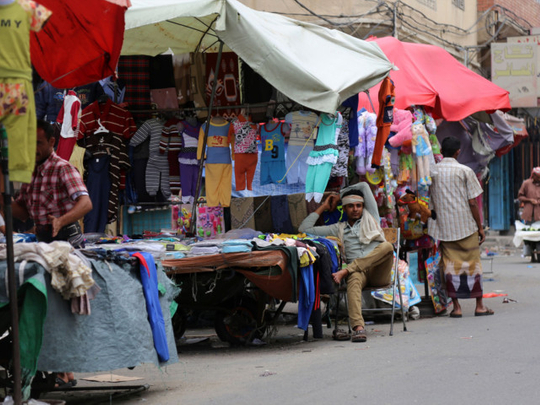
Cairo: The Saudi-led coalition behind a year-long military campaign against Yemen’s Iran-backed rebels is ready to commit to a ceasefire as long as the rebels abide by a UN Security Council resolution that calls for their pullout from Yemeni cities, the alliance’s spokesman said Friday.
Brig. Gen. Ahmad Al Asiri said that the Yemeni rebels known as Al Houthis should “show commitment” to the upcoming April 18 peace talks that could yield a political settlement. The rebels must also recognise the government of Yemeni President Abd-Rabbo Mansour Hadi and hand over their heavy weapons, he said.
If talks fail, Al Asiri said the military option remains on the table.
“The two tracks are parallel: the political and the military. Whatever way leads to the restoration of the internationally-recognised government, we will take,” Al Asiri added, speaking in the Egyptian capital, Cairo.
The Iran-backed rebels have been negotiating with the Saudis in past weeks on prisoner swaps and a halt of fighting along the Yemeni-Saudi border.
Yemen’s conflict pits Hadi’s internationally-recognised government, backed by the Saudi-led coalition, against Al Houthis, allied with former Yemeni president Ali Abdullah Saleh.
Al Houthis took over their country’s capital, Sana’a, in September 2014, and the coalition, which is backed by the United States, began air strikes against them in March 2015.
So far, Al Asiri said the coalition has managed to roll back Al Houthi gains in 85 per cent of Yemen’s territory, something others dispute since the rebels still control most of the northern cities and Sana’a.
The United Nations says the year-long conflict has killed about 9,000 people, including more than 3,000 civilians. On Thursday, Human Rights Watch issued a report detailing a recent deadly air strike that killed 119 people in a market in Hajja province, saying US-made bombs were used in the air strikes.
Al Asiri described the report as “misleading,” insisting the alliance only targets Al Houthis, who in turn use civilians as cover. He also claimed the United Nations is depending on flawed reports, mostly obtained from Al Houthis since the world body has no staffers on the ground.
“I challenge the United Nations agencies to show they have people on the ground” in Yemen, he said.
Yemen’s Al Qaida branch and other Islamist militants have exploited the chaos of the war to increase their footholds. In the past weeks, the United States has waged a series of air strikes targeting an Al Qaida training camp, positions, and vehicles.
Al Asiri said these were a “combined” effort, with the coalition providing intelligence and logistical support. But he said the war on Al Qaida requires a long-term strategy that involves restructuring and rebuilding Yemen’s security forces.
Washington considers Yemen’s branch — Al Qaida in the Arabian Peninsula — as the terror network’s most dangerous offshoot. In Yemen, the branch has managed over the past months to seize several cities along the Arabian Sea, including Mukalla, the provincial capital of Yemen’s largest province of Hadramout.












